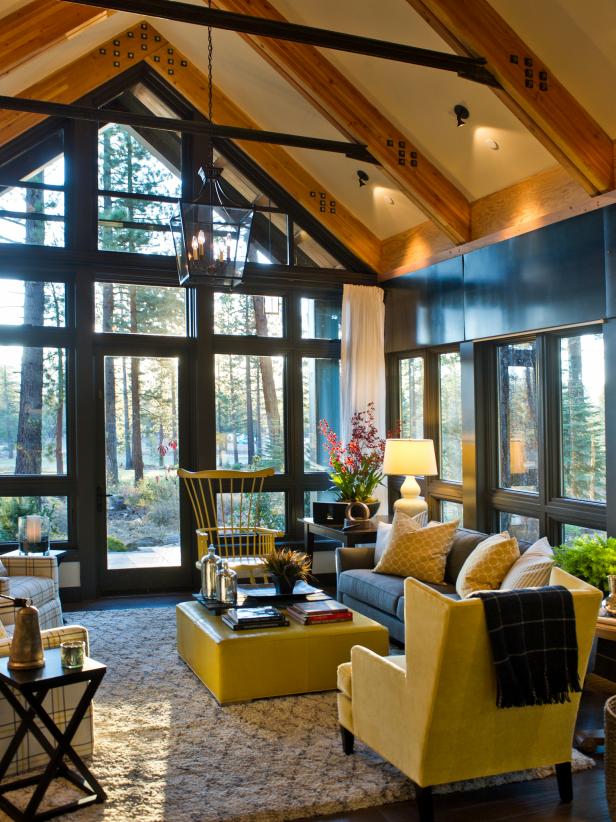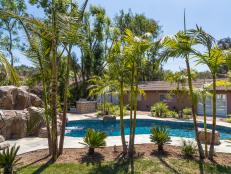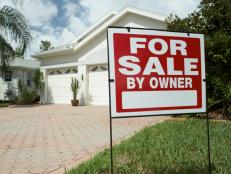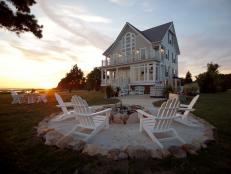Buying a Second Home: Are You Ready?

Eric Perry, 2013, Scripps Networks, LLC. All Rights Reserved
You’re at a stage of your life where you’re successful and making good money. Perhaps you’ve paid off the mortgage on your home or are close to doing so. You’ve got steady income and good credit and see potentially profitable opportunities in the housing market. Or maybe you’re just at the right place at the right time.
Philip Norman and his wife, Linda, for instance, weren’t looking for a second home. They were at their favorite vacation spot, near Palm Springs, when they came across an old flyer on a new-looking house in a gated community on a golf course. Out of curiosity, the 49-year-old business owner from Springfield, Mo., looked at it, saw the asking price and was stunned. “We couldn’t pass it up,” recalls Norman, who ended up opening his wallet last May.
Buying a vacation home or investment property is a great way to expand your real estate portfolio. But not everyone should necessarily whip out the checkbook and call a real estate agent. If you’re going to buy a second home, ask yourself a few questions first.
HOW YOU KNOW YOU’RE READY TO BUY A SECOND HOME
Two words: disposable income. Put simply, you’ve got money to spend, and real estate is where you want to put it.
Aside from money, age is another factor you should consider when buying a second home. According to Jeff Chervenak, branch manager of the mortgage lender Guaranty Federal in Farmington, Conn., the sweet spot for buying a second home is in your fifties.
It’s easy to see why, especially if you're a fiftysomething who's a parent. If you have kids, they’re probably well out of the diaper stage and have graduated college. You probably have more free time to devote to a second home, whatever your reasons for wanting one -- as a vacation retreat, as an investment or possibly because you simply want a second place to hang your proverbial hat.
Whatever the case, think this through so you don’t buy something that’s going to become a drain on your finances or something that you simply aren’t ready to tackle yet.
WHAT TO CONSIDER BEFORE BUYING A SECOND HOME:
THE QUESTIONS TO ASK YOURSELF
Am I ready to commit?
Consider your personality. Do you get bored easily? Are you restless? You may be better off renting a vacation home for a couple of years first, before buying and then realizing you’d like to vacation somewhere else.
If you’re buying a second home as a rental property, are you the type of person who doesn’t mind playing the role of landlord and making sure the roof isn’t leaking or taking care of a flooded basement? If you’re closing in on your retirement years, you may not mind the upkeep of a little bungalow in the mountains at 61, but how will you and your spouse feel when you’re 71?
How will this impact me financially?
Just because you have the money to spend doesn’t mean you should. Really consider the expenses of buying a second property and the ongoing financial commitments involved in maintaining it, such as property taxes and insurance. Also, talk to your tax professional about how a second home will impact your tax situation.
When looking for an investment property, a low price is not the only consideration. A turnkey operation is ideal -- something that doesn’t need repairs or much maintenance and steadily generates income, or, as experienced investors say, has “positive cash flow.”
Is it worth the money?
If you’re looking at a vacation home, think about how often you’ll use the property. The Normans say the main question they asked themselves was, “Would we be able to use the place enough to warrant the extra money?” Even though the house was a steal at $40,000, the Normans had to consider “the electric, water, insurance -- we also live in the Midwest, and so this home is not very close to us at all.”
“It was buying a home for the price of a car,” says Norman, who advises anyone considering purchasing a second house to “make sure it’s the right deal and not just an impulse buy. You need to look at the annual cost to see if you’ll use it enough to pay for it. Also, if it becomes too much, will you be able to get your money back?”
Should I buy with others?
When buying a property that requires more than a few hours to visit, it may be worth sharing the financial burden with others, like friends or family. The Normans ended up buying the Palm Springs home with two other friends who also enjoyed vacationing in southern California.
But before you purchase property together, set ground rules and consult an attorney. Find out how to buy property with other people.
THE COST TO YOU
From a financial standpoint, these years may later be remembered as the golden years for homebuyers. As Chervenak says, “It’s an excellent time to buy a second home. Really, the interest rates couldn’t be better, property values are down -- it really works out well. If you’re at all in the marketplace, this is the time.”
Philip Norman and his fellow co-buyers reaped the benefits. “No one ever thinks this kind of deal is for real,” Norman says, referring to the $40,000 he paid for a home near a golf course in a gated community. “This house wasn’t in need of any repair. Had an inspection completed and passed with flying colors.”
By the time Norman heard about the property, it had been marked down by $135,000. “I don’t have any idea what the first asking price was on the house or how long they were trying to sell it,” he says.
But before you jump at that well-maintained foreclosure down the street, know how the purchase will affect you financially in the short and long term.
Do I have enough cash?
As with any home purchase, you’ll need to factor in closing costs and a down payment, which in the case of a second home or investment property will be sizable. Typically, you’ll need to put down at least 25 percent of the purchase price. That’s a lot of cash to fork up and will no doubt deal a big blow to your bank account. Can you handle it? Will you still have enough cash on reserve for emergencies, like an accident or job loss?
How much will I spend on a monthly basis?
Even if the house is a bargain, there are other costs involved, not just the mortgage, taxes and utilities. You need to be insured, and if you’re looking at a second home in hurricane-prone Florida near the beach, for instance, you may need a lot of insurance.
And as with any house, maintenance costs money. Factor in the cost of any help you’ll need, including a housekeeper, landscaper, property manager and pool boy.
When buying a condo or townhome, factor in the homeowner association fees and any special assessments.
When buying a rental property, budget for added costs, such as marketing the home to potential renters, hiring a property manager and making repairs.
What are the tax implications?
The IRS has different rules for people with second homes and vacation homes (defined as such if you stay there at least two weeks a year), so before you do anything, consult your tax professional to find out how buying a second home will affect your tax situation.
What are my “out” options?
If you decide the property isn’t working out for you, how hard will it be to sell it or rent it out? How much will it cost you? Planning ahead and coming up with a plan B will help you deal with potential surprises.
THE HOUSE FOR YOU
If money is not an issue and you’re buying a vacation home with the intention of living the life you’ve always dreamed of (after all, this is the good life), then your search will be all about what will make you happy.
You may also want to consider buying new construction or custom building a second home. Some homeowners have a specific vision and would rather buy land and design the home themselves.
Whether you’re looking for a pueblo home and a laid-back Southwestern lifestyle or a traditional Victorian with its own vineyard in Napa, make a wish list and go for it.
If, however, you prefer a more modest vacation home with minimum maintenance and upkeep, the ranch, modern or contemporary home styles work well. You want it to be as hassle-free as possible, especially if you live far away or if this is an investment property.
"Attached" homes, like a condominium or townhouse, make great second homes, because you don't have to worry about the issues owners of detached homes do, like the exterior and outdoor areas. When looking at condos, research the homeowners' associations (HOAs). Ask about monthly fees, special assessments and community rules.
THE NEIGHBORHOODS AND AREAS FOR YOU
“One of the keys in being successful in investing in a second home is the oft-repeated real estate mantra of 'location, location, location,'” says Ben Spofford, the president of two companies based in Aurora, Ohio: Leader Investment Group and Realtyrto.com, a rent-to-own real estate firm.
Although he says it’s a cliche, “it’s so true. The success of a second home investment can, in part, depend on purchasing in the neighborhood that generates the most demand, whereas a house one block over may be the odd man out. Today, the astute investor should take the extra time to study the demographics of a specific neighborhood before making an investment. And even then, there is no guarantee.”
It depends what you’re looking for, of course, but obviously the coastal areas, especially in vacation hot spots, are well known for having second homes. Resort communities are also great places to look.
Affluent condominium communities are often extremely in sync with baby boomers who want that second home.
For instance, the Residences at Dockside, in Philadelphia, have a program called “Be Our Guest,” which allows buyers to stay a night in a designer two-bedroom condo with waterfront views of the Center City skyline and the Ben Franklin Bridge. In other words, they cater to and want potential buyers to really see what they’re getting, even throwing in personal town car service throughout the city, dinner for two at one of the finer restaurants, admission to a local museum and brunch on the river the next morning.
But often it’s not where you look for a second home, but who you get to help you. If your mortgage broker has a CMPS at the end of his name or title, that’s a good clue. It means that he's a certified mortgage planning specialist and has been heavily trained in financing second homes.














































